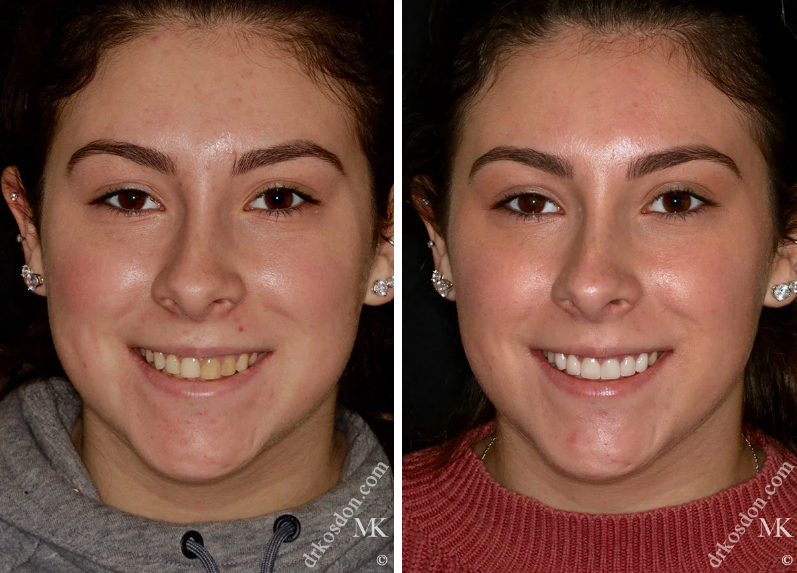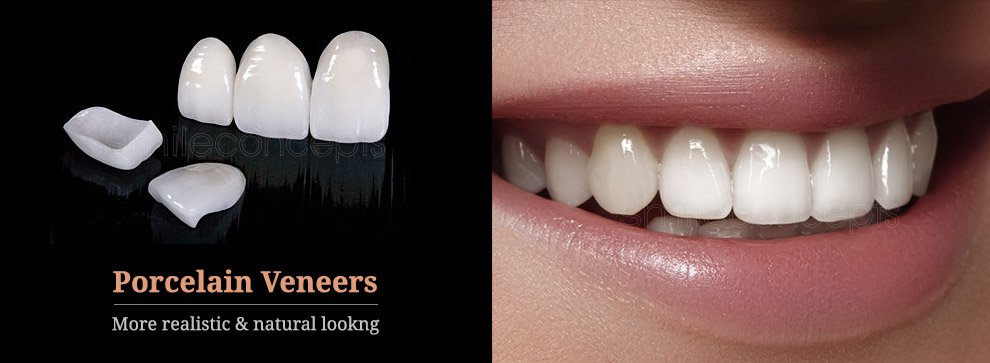Top Advantages of Dental Veneers for Teeth Restoration
The Complete Introduction of Veneers: Types, Makes use of, and Their Effect on Your Smile
Veneers function as a preferred option for people looking for to enhance their dental appearances. These custom-crafted coverings can successfully mask imperfections such as discoloration and gaps. With 2 main types available, porcelain and composite resin, each offers unique advantages and constraints. The effect of veneers prolongs beyond simple look, influencing self-esteem and social interactions. Comprehending their kinds and benefits is important. What might this mean for one's general lifestyle?
Recognizing Veneers: What They Are and Just how They Function
Veneers are thin shells, commonly made from porcelain or composite resin, that are custom-crafted to fit over the front surface area of teeth. They serve both practical and visual purposes, supplying a service for various oral imperfections such as discoloration, spaces, and small imbalances. By adhering to the tooth enamel, veneers develop a natural look while enhancing the shape and color of the teeth.
The procedure usually includes a first assessment, where a dental professional analyzes the client's requirements and reviews desired outcomes - Porcelain Veneers. Following this, a marginal quantity of enamel might be removed to fit the veneer. Impressions of the teeth are then required to assure an exact fit. When produced, the veneers are bonded safely to the teeth using an unique dental adhesive. This treatment not only boosts the smile's appearance but also helps protect the underlying teeth from additional damages, making veneers a popular option for several looking for a smile remodeling
Sorts of Veneers: Porcelain vs. Compound Resin
The distinction in between porcelain and composite material veneers exists in their material structure and attributes. Each type supplies differing levels of expense, long life, and resilience, influencing people' selections based on their individual requirements. Understanding these distinctions is vital for making a notified decision concerning dental improvements.
Material Distinctions Described
While both porcelain and composite material veneers offer the exact same cosmetic purpose, they vary significantly in material properties, sturdiness, and aesthetic results. Porcelain veneers are crafted from a ceramic material that simulates the natural transparency of teeth, offering a realistic look. Their smooth surface is immune to staining, making them an appealing alternative for those seeking a resilient visual. On the other hand, composite material veneers are made from a tooth-colored plastic material, offering versatility and simplicity of application. They may not achieve the very same level of illumination or clarity as porcelain. Furthermore, composite veneers can be much more easily formed and fixed, making them an extra versatile choice in certain dental situations. Each type offers distinct benefits customized to specific preferences.
Longevity and Toughness
Durability and sturdiness are substantial elements when comparing porcelain and composite resin veneers. Porcelain veneers are known for their stamina, frequently long lasting 10 to 15 years with correct care. Their resilience versus damaging and staining makes them a favored option for individuals looking for long-lasting outcomes. In contrast, composite material veneers normally have a much shorter lifespan, balancing 5 to 7 years. While they can be fixed extra quickly if harmed, they are a lot more susceptible to use and staining with time. The selection between these materials frequently depends upon the individual's way of living, aesthetic goals, and upkeep preferences. Inevitably, understanding the differences in durability and toughness can direct individuals in picking the veneer type that best fits their demands.
Cost Contrast Insights
When selecting between porcelain and composite resin veneers, price is a crucial consideration. Porcelain veneers commonly vary from $800 to $2,500 per tooth, reflecting their longevity, aesthetic charm, and resistance to discoloration. These veneers call for a much more extensive procedure and specialized laboratory work, adding to their higher cost. On the other hand, composite resin veneers are generally a lot more economical, setting you back between $250 and $1,500 per tooth. They can be applied in a solitary visit, which decreases labor expenses. Composite veneers might require extra constant replacements, potentially enhancing long-lasting costs. Eventually, the selection in between porcelain and composite material veneers relies on specific budgets and desired results, balancing preliminary expenses versus long life and aesthetic results.
The Advantages of Choosing Veneers for Your Smile
Picking veneers uses considerable benefits for those looking for an improved smile. Their boosted visual charm can transform the appearance of teeth, while their stain-resistant buildings guarantee a long-term brightness - Porcelain Veneers Dentist. This mix makes veneers a popular alternative for individuals looking to attain a flawless smile
Improved Visual Allure
When people seek to improve their smiles, veneers usually become a popular service due to their transformative visual advantages. These slim coverings, normally made from porcelain or composite material, can effectively hide flaws such as chips, voids, and imbalance. By imitating the natural appearance of teeth, veneers provide a smooth, radiant smile. Their adjustable nature allows for a customized technique, enabling individuals to select tones and shapes that ideal fit their face features. Additionally, veneers can create a consistent appearance, boosting overall facial balance. This aesthetic enhancement not just improves confidence however can also positively affect social interactions and personal connections, making veneers a prominent option for those aiming to achieve a brighter, much more attractive smile.
Stain Resistance Advantages
Veneers not only enhance visual charm but also supply considerable tarnish resistance, making them an eye-catching option for individuals worried concerning keeping a brilliant smile. Made up of durable materials such as porcelain or composite material, veneers are much less porous than natural teeth, which aids protect against the absorption of spots from typical culprits like coffee, tea, and merlot. This fundamental tarnish resistance enables people to enjoy their favored beverages without fretting about staining. Porcelain Veneers. Furthermore, the smooth surface of veneers makes them less complicated to tidy, more boosting their durability and preserving their pristine look. Because of this, veneers offer a useful service for those seeking both elegance and functionality in their dental treatment
The Refine of Getting Veneers: What to Anticipate

Although the procedure of obtaining veneers may seem intimidating, recognizing the steps included can ease worries. Initially, an examination with a dental professional is needed to establish if veneers are the suitable solution for the individual's oral concerns. Throughout this consultation, the dentist will certainly discuss desired results and take impacts of the teeth.
Next off, a 2nd consultation is arranged for tooth preparation, where a percentage of enamel is usually removed to fit the veneers. Short-lived veneers might be positioned while the custom ones are crafted in a dental lab, which generally takes a number of weeks.
Once ready, the dental professional will certainly position the veneers, making sure proper fit and shade prior to bonding them to the teeth utilizing a special adhesive. After final changes, the dental professional will certainly offer support on treatment. Understanding these steps can assist people feel a lot more comfy and notified throughout the veneer sites procedure.
Maintenance and Take Care Of Your Veneers
Preserving veneers needs consistent like ensure their longevity and appearance. Proper oral health is necessary; brushing twice daily with a non-abrasive toothpaste and flossing regularly assist protect against plaque accumulation around the veneers. Additionally, regular oral examinations are essential for keeping track of the problem of the veneers and dealing with any kind of prospective concerns early.
When biting to avoid damages, clients ought to stay clear of hard foods and excessive pressure. It's likewise suggested to limit usage of discoloring compounds, such as coffee, tea, and red white wine, as these can affect the veneers' color over time.

Transforming Your Smile: Real-Life Effect of Veneers
A radiant smile can substantially boost one's confidence see and general look. For lots of people, veneers function as a transformative remedy, successfully dealing with various dental concerns such as discoloration, gaps, and misalignment. These thin shells, tailor-made to fit over the front of the teeth, can develop a harmonious and aesthetically pleasing smile.
Real-life cases illustrate the profound effect veneers can have. People usually report an immediate boost in self-worth and social interactions following their treatment. The newfound self-confidence can bring about more chances in specialist and individual life, as individuals really feel even more likely to involve and express themselves.
Additionally, the emotional benefits extend past simple look; lots of experience enhanced psychological well-being as they welcome their smiles. Subsequently, veneers not only enhance physical features however additionally contribute significantly to general top quality of life, emphasizing their worth in cosmetic dental care.
Often Asked Questions
For How Long Do Veneers Usually Last Before Needing Replacement?
Veneers commonly last between 10 to 15 years prior to calling for replacement. Elements such as oral hygiene, oral behaviors, and the sort of product used can influence their durability and overall durability. Regular dental exams are recommended.
Can Veneers Be Removed, and if So, How?
Yes, veneers can be gotten rid of. A dental expert normally uses customized tools to carefully detach them from the teeth, guaranteeing very little damage to the underlying enamel, frequently adhered to by needed changes or restorations for suitable aesthetics.
Are Veneers Suitable for Everybody's Dental Condition?

Will Obtaining Veneers Hurt or Require Anesthesia?
Getting veneers usually entails very little pain, and several patients receive regional anesthesia to ensure a pain-free experience. Level of sensitivity might take place momentarily afterward, however most find the procedure tolerable and are satisfied click site with the results.
How Do Veneers Affect Tooth Level Of Sensitivity After Placement?
Veneers can briefly enhance tooth sensitivity due to the elimination of enamel and the bonding process. Many people experience a reduction in sensitivity with time as the teeth get used to the brand-new veneers.
Veneers are thin coverings, generally made from porcelain or composite material, that are custom-crafted to fit over the front surface of teeth. Porcelain veneers are crafted from a ceramic product that mimics the natural translucence of teeth, giving a realistic look. Porcelain veneers commonly vary from $800 to $2,500 per tooth, showing their durability, visual allure, and resistance to discoloration. In comparison, composite resin veneers are generally extra budget friendly, setting you back between $250 and $1,500 per tooth. Made up of resilient products such as porcelain or composite resin, veneers are much less permeable than all-natural teeth, which helps protect against the absorption of stains from usual wrongdoers like coffee, tea, and red wine.